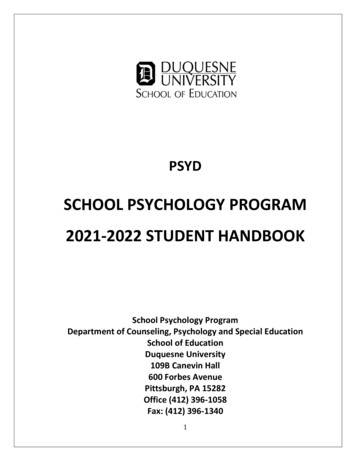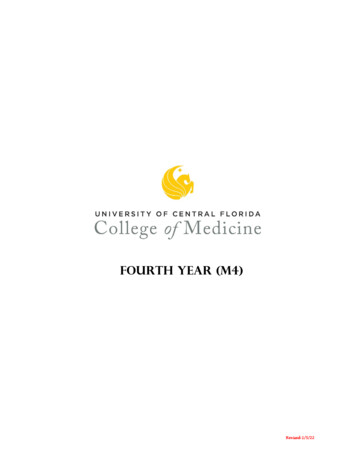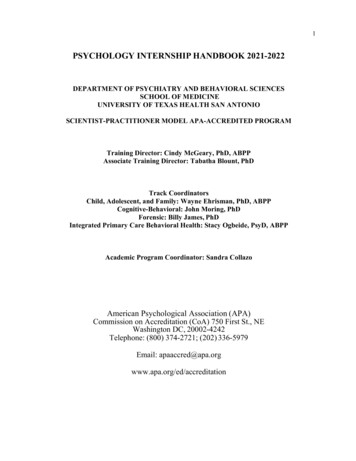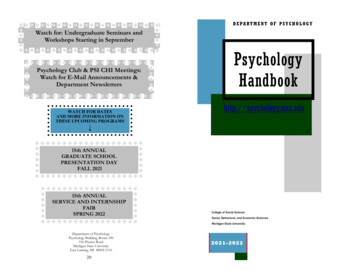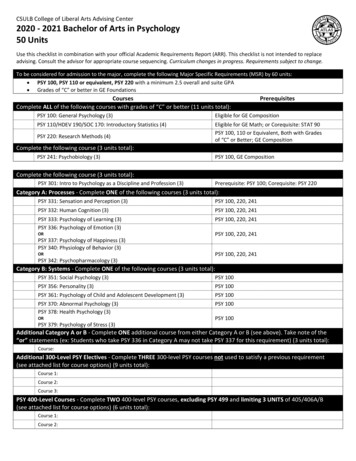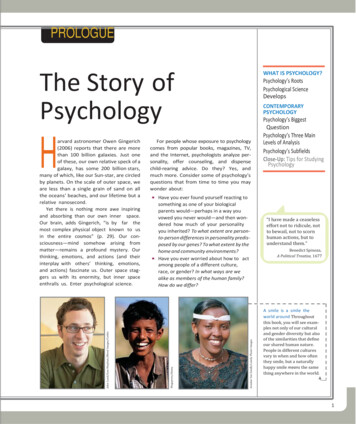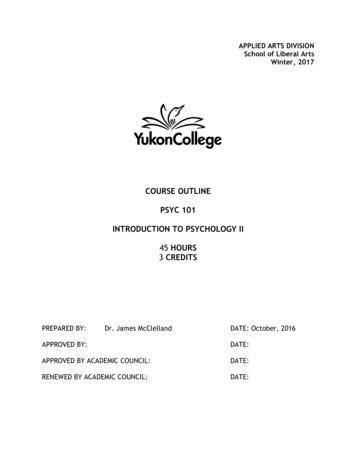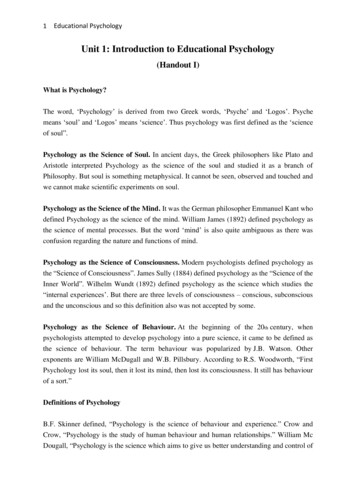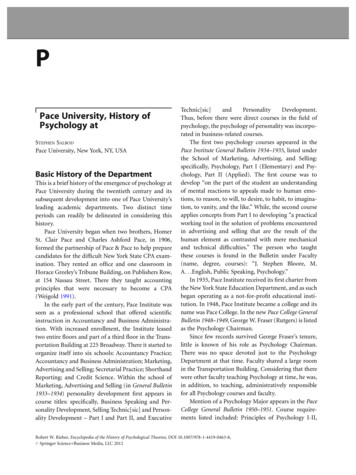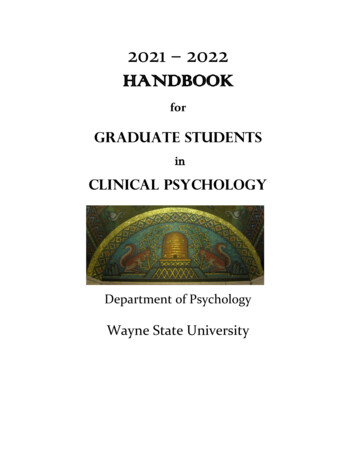
Transcription
2021 – 2022HANDBOOKforGRADUATE STUDENTSinCLINICAL PSYCHOLOGYDepartment of PsychologyWayne State University
2The Clinical Psychology Doctoral Training Programat Wayne State University has been continuously accredited by theAmerican Psychological Association since 1960.*Revised August 2021* The Ph.D. Program in Clinical Psychology at Wayne State University is accredited through2028 by the Commission on Accreditation of the American Psychological Association.Questions related to the program’s accredited status should be directed to the Commission onAccreditation:Office of Program Consultation and AccreditationAmerican Psychological Association750 First Street, NEWashington, DC 20002-4242Phone: (202) 336-5979 / email: apaaccred@apa.orgWeb: www.apa.org/ed/accreditation
3PREFACETo our studentsThe goal of this Handbook is to describe the policies and program for graduate students who arein Clinical Psychology Doctoral Training Program at Wayne State University. As you read thisHandbook, keep in mind that the Psychology Department, the College of Liberal Arts &Sciences, and the Graduate School of the University have specific policies for all graduatestudents, but those policies are not fully described in this Handbook.The website of the Department, Information for Current Graduate Students, has material thatapplies to all graduate students in the Department. Clinical program graduate students need toknow and abide by this information. In some circumstances, however, the expectations andexperiences of clinical psychology students differ from those of other psychology graduatestudents. Therefore, it is essential for clinical graduate students to read this Handbook as well.For some departmental requirements, this manual clarifies or replaces policies that apply to nonclinical students. Also, our Psychology Clinic (http://www.clas.wayne.edu/psychclinic/) has aPolicy and Procedures Manual, which is given to all students at the start of their time in ourProgram. The manual provides vital information about the functioning of the Psychology Clinicand sets forth procedures that must be followed by everyone working in the Clinic.The College of Liberal Arts & Sciences information for current graduate students is alsoimportant (CLAS Information for Current Students). In addition, the Graduate School’s GraduateBulletin and Ph.D. Information website are essential sources of university-level policies forgraduate students.Although we have endeavored to make this Handbook clear and complete, it is possible thatthere are unintended omissions or inaccuracies. Please bring problems or mistakes to ourattention so we can make corrections. We also welcome suggestions.Finally, this Handbook is not a static set of rules. It changes—usually each year—in response togrowth in the field of psychology, modifications to our curriculum, new requirements foraccreditation or licensure, changes in university requirements, and other events and influencesthat we cannot anticipate. Programmatic decisions and policies can also change. When programchanges occur that could affect your education or progress, we will work to tell you, and willrevise the Handbook as soon as possible. Each year, the revised Handbook will be posted on ourprogram website. In addition, even if there are significant changes that are likely to affect yourpath through the program, it will generally be true that the Handbook in use when you begin yourdoctoral study will provide the standards that apply throughout your progress toward yourdoctorate.– The Clinical Psychology Faculty
4Table of ContentsPreface .3Table of Contents .4Key People and Their Roles in the Department .5I. Overview of Doctoral Training in Clinical Psychology at WSU .6Mission .6Major Curricular Emphases7II. The Curriculum in Courses8Required Clinical Program Courses8Required Departmental Courses9Courses Providing Discipline Specific Knowledge9Advanced Integrative Discipline Specific Knowledge .10Minor or Concentration .10Alternatives to Required Courses10Common Minors in Clinical Psychology . .11Child Clinical / Developmental Psychopathology11Community Psychology11Health Psychology11Neuropsychology12Transferring in and Waiving Graduate Courses12III. The Curriculum in Clinical Skills13The Psychology Clinic13External Placements16Clinical Work Beyond Placements17Professional Liability Insurance .18Tracking Your Progress in Clinical Training18Predoctoral Clinical Internship18Clinical Skills Beyond Graduate School19IV. The Curriculum in ResearchWorking with an AdvisorMaster’s ThesisDoctoral DissertationOther ResearchV. Progress through the Clinical Training ProgramOverview of Requirements and Expected TimetableStandard Sequence of CoursesAcademic Work and ResearchDoctoral Qualifying ExaminationsDoctoral Candidacy, Internship, and GraduationTeachingClinical Area AwardsLicensureOur Graduates202020212324242628293233343536
5VI. Financial Issues37VII. Ethics, Evaluations, Professionalism, Problems, and Resolutions39Ethics39Public Professionalism-Websites, Twitter, Blogs, Email, and Voicemail 40Progress, Personal Development, and Evaluation41Appeal of Evaluation and Complaints, Concerns, or Grievances45VIII. Other Resources and Guidelines47Key People and Their Roles in the DepartmentDirector of Clinical Training (DCT)Clinical Program Chair / HeadDirector of Psychology ClinicAssociate Director of Psychology ClinicChair, Department of PsychologyAssociate Chair & Chair, Graduate StudiesCommittee, Department of PsychologyGraduate Academic Service OfficerPersonnel / Human ResourcesGrants ManagerUndergraduate Academic Service Officer, SeniorAdvisor, & Instructor’s Textbooks:Mark Lumley, Ph.D.Valerie Simon, Ph.D.Douglas Barnett, Ph.D.Marilyn Franklin, Ph.D.Scott Bowen, Ph.D.Emily Grekin, Ph.D.Alia AllenDelores TennilleShelly Seguin
6I. Overview of Doctoral Training in Clinical Psychology at WSUThe WSU Clinical Psychology Doctoral Training Program is committed to the ScientistPractitioner model of clinical psychology, in which research, practice, and the sharing ofknowledge interact to inform and influence our profession and the public good.MissionOur mission is to develop highly competent professionals who have these characteristics: They are practitioners of clinical psychology who are scientifically-informed andevidence-based in their professional work. They are scientists who contribute to the knowledge base of clinical psychology. They are educators committed to sharing clinical research and knowledge, for thebetterment of the discipline and the public good.Our scientist-practitioner program provides a balance of training in clinical skills, research, anddissemination of knowledge, so upon graduation, you will be competent performing yourprofessional skills with diverse groups of people in a variety of settings. The urban setting ofWayne State University offers practicum and research facilities in many different clinicalsettings, providing you with exposure to a wide variety of health problems across a broadspectrum of individuals and families of varied cultures and socioeconomic status.It is our intention that training in this program provides you with knowledge, skills, and habits ofmind that enable you to take on a wide array of possible future roles and circumstances,including situations that could be beyond the present range of the science and practice of clinicalpsychology. As a Ph.D. graduate of Wayne State’s doctoral program in clinical psychology, wewant you to approach your work with a combination of the curious, disciplined perspective ofscientists and the sensitivity of good practitioners, whatever that work may be. Psychology is adynamic field; thus, the training we provide in general psychology, ethics, psychopathology,assessment, intervention, research methods, and diversity—well-rooted in scientificmethodology—is intended to prepare you to adapt to whatever your future holds.As a student in our program, your curriculum includes many kinds of experiences. These includeclasses in basic and clinical psychology; developing clinical skills within and beyond theDepartment of Psychology; conducting and reporting research; teaching and makingpresentations; and more. Our program is hierarchical; thus, you are educated first to be a stronggeneral psychologist, familiar with the broad domains of psychological science. The nextobjective is to train you to be an empirically-guided clinical psychologist who works with arange of problems and peoples, giving clinical services in assessment, intervention, andconsultation. Third, you will focus in some particular area or areas of clinical psychology. Mostcommonly these are neuropsychology, health psychology, community psychology, or childclinical/developmental psychopathology. Whatever your interests, you will contribute originalresearch, develop your clinical skills, and communicate your expertise with the public throughteaching, writing, and presenting your work.
7Major Curricular EmphasesFirst. Students have extensive coursework in psychological science, including a broadbase in general psychology, plus clinical courses in psychopathology, psychologicalassessment, and psychological interventions.Second. Students participate in research training throughout their graduate schoolyears, including coursework in research methods and statistics. Students work closelywith research advisors throughout their program, and each student conducts researchthat is increasingly independent, producing both a master’s thesis and a doctoraldissertation, and often additional research.Third. Students have a substantial amount of supervised clinical training inpsychological assessment and intervention. This begins in our in-house PsychologyClinic (supervised by program faculty), expands into at least one (but typically more)part-time externships or placements in the community, and culminates in a yearlong,full-time predoctoral internship.Fourth. Students gain experience in teaching and other forms of knowledgedissemination. Each student teaches one or more laboratory sections or independentundergraduate courses. In addition, students get training and experience inconsultation and supervision, and presenting and publishing their research.Fifth. Students develop their individual identity as professionals who contribute to thecommon good by engaging service at any of several possible places, including theDepartment, Clinic, University, community, or the profession.Sixth. Students develop a high degree of cultural awareness and sensitivity beyondtheir own background. The urban setting of Wayne State University provides athorough grounding in the challenges of urban life and of being of minority status inAmerica. Metropolitan Detroit is very diverse, with sizeable populations havingcultural roots in the breadth of Europe, the Middle East, Africa, Asia, and LatinAmerica. In addition, our doctoral students work with persons of all income andeducational levels as well as quite varied cultural and religious characteristics. ManyWSU students, clinic clients, and research participants are not affluent; some live insevere poverty. In our graduate training program, every student must interact with andvalue persons whose culture, world view, religion, and life circumstances differ fromtheir own.Seventh. Throughout their training and professional lives, students are expected todemonstrate high ethical standards in their behavior. In every one of the preceding sixareas of emphasis, ethical questions, challenges, and standards are discussed forreflection and personal growth.
8II. The Curriculum in CoursesFormal coursework will occupy a great deal of your time, particularly during your early years inthe program. There are required clinical courses, other course requirements doe the Departmentof Psychology, and courses required by the American Psychological Association or for licensure,as well as elective courses that you choose according to your own individual interests.Our minimum required curriculum meets accreditation requirements of the AmericanPsychological Association (APA). However, it does not necessarily ensure that you will belicense-eligible in all jurisdictions. Licensing and credentialing requirements vary by state,province, or nation; are open to interpretations by those who review applications; and sometimeschange, even during the time that you are enrolled in the program. We strongly recommend thatyou learn the licensing requirements of the jurisdictions in which you may work (seehttp://www.asppb.org/) and construct your graduate coursework and other required doctoralwork to suit those standards.Required Clinical Program Courses (Effective for class of rse NamePsychological Assessment I (and laboratory)Psychological Assessment II (and laboratory)Assessment Practicum 1Assessment Practicum 2Assessment Practicum 3Ethics, Professional Issues, & Diversity: Part 1 IntroductionEthics: Part 2 Ethics and DiversityEthics: Part 3 Ethics and Professional IssuesResearch Methods in Clinical PsychologyDiversity, Systems, and InequalityPsychopathologyPsychological Interventions IPsychological Interventions IITherapy Practicum 1Therapy Practicum 2Therapy Practicum 3Clinical Seminar (Spring/Summer Year 3–5), encouraged *Candidate Maintenance Status: Clinical Internship (fall)Candidate Maintenance Status: Clinical Internship (winter)Candidate Maintenance Status: Clinical Internship (spr/sum)Credithours44111111333331112 000* If student has departmental / university tuition coverage for 2 credits in the Spring/Summer, andthey are not using for other courses, we ask the student to register for PSY 8760 for those semestersat the end of years 3, 4, and/or 5.
9Required Departmental CoursesStudents must complete all of the 9995Course NameQuantitative Methods I (and laboratory)Multivariate Analysis (and laboratory)Master’s Thesis (total)Dissertation Status IDissertation Status IIDissertation Status IIIDissertation Status IVCandidate Maintenance Status: Internship (3 semesters)Credithours4487.57.57.57.50Courses Providing Discipline Specific Knowledge (DSK)Students must take one course from each of the following five domains:PSYCourseNumber7120733076207450 a7645708070907440 a74007450 a7440 aCourse Name1 Biological bases course, chosen from these:Biological Basis of BehaviorClinical Neuropsychology1 Social bases course, chosen from these:Social PsychologySocial Development Across the LifespanSocial Psychology of Close Relationships1 Cognitive/Affective bases course, chosen from these:CognitionLearningCognitive Development1 Developmental bases course, chosen from these:Introduction to Lifespan Developmental PsychologySocial Development Across the LifespanCognitive DevelopmentCredithours3333aEither of these two courses can fulfill two basis areas: PSY 7440 can fulfill both Cognitive andDevelopmental bases, OR PSY 7450 can fulfill both Social and Developmental bases. If you takeone of these courses to fulfill two bases, the other course will fulfill only one basis.We recommend that you take the courses that provide the broadest and most general educationalfoundation in each domain; those courses noted above are bolded. These courses are botheducationally optimal and provide the greatest likelihood of being accepted by licensing bodies.
10Advanced Integrative Discipline Specific Knowledge:Students must take one of the following courses that integrate two or more DSK domains. Thecourse could be the same as one that fulfills one of the four DSK domains ry of PersonalityDevelopmental PsychopathologyClinical NeuropsychologyCognitive DevelopmentSocial Development Across the LifespanCognitive NeuroscienceBiological Bases of Health PsychologyDevelopmental NeuropsychologySocial CognitionPediatric Neuropsychology3333333333Minor or Concentration:Students must take 3 graduate courses (minimum of 8 credit hours) that form a coherent topic orarea of focus to advance the student’s career objectives.Three graduate courses outside of the required clinical program courses: Only one of the three courses may fulfill a DSK requirement listedabove One of the three courses may fulfill the Advanced Integrative DSKrequirement, but only if different than one used to fulfill a DSKrequirement One of the three courses must be different than those used to fulfill theDSK and the Advanced Integrative DSK requirementsMinimumof 8creditsAlternatives to Required CoursesOccasionally a student identifies a graduate course, combination of courses, other intensiveexperiences (e.g., directed study or research), or prior courses / experiences that the studentwishes to have substitute for one of the above-required courses. If so, you must obtain programapproval for this alternative course(s) or experiences. You must send the Graduate Officer andDCT a request explaining your reasoning, along with the syllabus or at least a full description ofthe potential alternative course(s) / experiences. The DCT and a faculty committee will reviewthis material and make a determination of whether or not the alternative course(s), incombination with your other coursework or experiences, are sufficient to fulfill the intendedrequirements.
11Common Minors in Clinical PsychologyStudents develop a specific area of interest that builds upon the basic curriculum. Even thosestudents who wish to remain “generalists” are expected to develop additional expertise beyondthe standard course requirements, as might be fitting to their career goals. Therefore, you musttake 8 credits (usually three courses) that reflect your interests and constitute a minor. Typicalminors are commonly interests that overlap with particular clinical psychology specialties, suchas neuropsychology, child clinical psychology, health psychology, etc. However, minors are notlimited to traditional specialties of clinical practice. You are free to create a minor that reflectsyour interest and expertise in statistics, health care, public policy, business, and so on. Graduatecourses for the minor may be taken outside of the Psychology Department. The department mustapprove your minor and the courses that you take to make up that minor.Child Clinical / Developmental Psychopathology. If you wish to pursue a career working withchildren or adolescents or investigating problems that emerge during development from infancyto young adulthood, you will most likely complete advanced courses in DevelopmentalPsychology, including Developmental Psychopathology. Other courses commonly taken bypersons with these interests include Attachment Relationships Across the Lifespan, SocialDevelopment Across the Lifespan, and Cognitive Development. You will seek placements inclinical settings and a predoctoral internship that focus on work with children, and then take aninternship at a site that serves children, teens, and their families. You will be expected to conductresearch on issues from the prenatal period to young adulthood, developmental problems, familyissues, or interventions with children and adolescents. Note: If you are interested in clinical workor research with young children under 5 and/or postpartum issues, you might consider pursuingthe Infant Mental Health Dual Title Program.Community Psychology. If your interest is community psychology, you should take courses thatinclude Community Psychology; Theories and Methods of Program Evaluation; and at least oneother relevant course, such as Multicultural Perspectives in Psychology, Prevention ofMaladjustment, Developmental Psychopathology, or a course outside of the Department (e.g.,anthropology, law, political science, community medicine). You will also conduct research andgain clinical and other applied experience in community settings.Health Psychology. If you wish to pursue a career in medically-oriented settings or deal withhealth-related problems, you should minor in health psychology. Such students typically take atleast two, but sometimes all three of the following: PSY 8300 (Basic Theory and Research inHealth Psychology), PSY 8310 (Clinical Applications of Health Psychology), and PSY 8320(Biological Bases of Health Psychology). Depending upon your special interests, a course fromthe clinical neuropsychology sequence or other courses in the department can be elected. Coursesrelated to health offered by other departments (e.g., medical anthropology, public health, healtheconomics, medical sociology, gerontology) could also be taken. Direct clinical experience inhealth psychology is offered in a number of placements including hospital medical wards,primary care clinics, and outpatient specialty clinics. A predoctoral internship that focuses onhealth is typically taken, and a post-doctoral fellowship in this field is increasingly becoming
12standard if you wish a career as a clinical health psychologist. Finally, if you minor in healthpsychology, you are expected to focus your research in that field.Neuropsychology. If you minor in the area of brain-behavior relationships, you likely willcomplete Biological Basis of Behavior (PSY 7120), Clinical Neuropsychology (PSY 7330), andNeuropsychological Assessment (PSY 8340), and possibly courses in DevelopmentalNeuropsychology, Neuroanatomy, and Psychopharmacology. You should pursue various clinicalplacements in the Detroit area where you can work in conjunction with neuropsychologists.Students interested in neuropsychology typically choose a predoctoral internship that includesneuropsychology training, and a 2-year post-doctoral fellowship in neuropsychology is standard.In addition, your research interests during and following your training will focus onneuropsychology.Transferring in and Waiving Graduate CoursesPerhaps you have taken graduate courses in other universities (or departments at Wayne State),and you seek to transfer in these courses for credit, or at least have the course “count” for one ofthe courses in our program, thus waiving the requirement to take a particular course in theregular program. This is most common when students come to our program having been in apsychology master’s program elsewhere. Transferring in or waiving courses is possible for some,but not all courses. All core clinical courses (psychopathology, assessment, intervention, ethics,practica) must be taken in our program, even if you have taken such courses elsewhere. Graduatecourses—even those that go by the same name—are often very different across institutions. Wewant our clinical psychology graduates to have the core domains of their clinical education occurat Wayne State. It is also the case that doctoral qualifying exams must be taken here at WayneState, and these qualifying exams tap into the content of the core clinical courses as they aretaught here. We cannot guarantee that a course by the same name would prepare you for thequalifying examinations here.Students can petition to have other departmental courses as well as elective courses transferred orwaived. These might be courses such as statistics, history, learning, developmental, personality,and so on that are not clinical courses. Any course that is to be substituted for a WSU coursemust be substantially the same as the class taught in our department. However, approval is notguaranteed. For some courses, such as statistics, the department may require the student to takean exam or otherwise demonstrate competence to waive or transfer the course. For other courses,faculty will be assigned to review your transcript as well as the syllabus of a course takenelsewhere, to determine whether it is comparable to one of our courses. If so, then it can betransferred in or waived. If you wish to ask for a course to be transferred into your courseworkhere, be sure to talk to the Graduate Officer in the department, who is the person who advises allgraduate students concerning the procedures necessary to make such a request.
13III. The Curriculum in Clinical SkillsExpertise in the clinical skills of assessment and therapy are the hallmarks of clinicalpsychology. In the WSU Clinical program, you will take coursework concerning clinical skills(see the preceding section). However, key to the development of expertise in clinical skills istraining in the actual provision of assessment and therapeutic services. This is done through workin the Psychology Clinic, in various clinical settings beyond the University (external placementsor practica), and in a final, yearlong predoctoral internship. All internal and external clinicaltraining must be supervised by a psychologist who meets regularly with you.The Psychology Clinic (http://www.clas.wayne.edu/psychclinic/)The initial training and practice in clinical skills takes place at the Wayne State UniversityPsychology Clinic. All students in the program are required to complete both a 1-year practicumin Assessment followed by a 1-year practicum in Intervention / Therapy. Each of these practicaprovides about 500 hours of clinical training (i.e., about 1,000 hours across the two practica).Both include a 2-hour per week course for all three semesters of the year, in addition to clientcontact, supervision, readings, report or note preparation, and other training functions. Thepractica at the Psychology Clinic involve assessment and therapy offered to a varied populationof individuals, couples, and families. In addition, you are required to remain active in the clinicafter your practica are completed, until you leave for your one-year, full-time pre-doctoralinternship.Rands House: location of the Psychology Clinic at Wayne StateAssessment Courses and Practicum. In the first two semesters of Year 1, students take twocourses in the conceptual and theoretical bases of assessment. The first semester consists largelyof adult intellectual, academic, and objective personality testing, along with conceptual issues inassessment. The second semester includes both projective personality assessment and assessmentof children. There are laboratories associated with each of these two courses that focus onspecific assessment, testing, and report writing skills. Advanced graduate students who are ClinicTeaching Assistants run these laboratories. Starting in the summer at the end of year 1, you willtake a sequence of three assessment practica, totaling one year (summer plus both semesters of
14year 2), that require a minimum of 9 satisfactorily completed integrative assessments done withclients at the Psychology Clinic, and which provide about 90 hours of face-to-face time withclients. Different faculty supervisors are assigned for each case. In addition, there are advancedassessment elective courses that some students take, focusing on particular types of problems orindividuals, such as neuropsychological assessment or assessment of infants and toddlers.Psychotherapy Courses and Practicum. Two foundation courses in psychological interventionsoccur in your second year. The first course focuses on adult, individual therapy, includingempirically-supported treatments; empirically-supported relational factors and therapy matching;and various traditional schools of therapy. The second semester covers child, family, couples,group, and systems-oriented therapy. In the summer at the end of year 2, you will start threesemesters (i.e., one year) of therapy practica, in which you maintain a caseload of three clientsand obtain at least 90 hours of face-to-face intervention time. Weekly supervision occurs with anassigned faculty supervisor.Advanced Training at our Psychology Clinic (beyond the required Assessment and TherapyPractica)All clinical students are required to complete the full 3-semester Assessment practicum series,followed by the full, 3-semester Therapy practicum series. Successful completion of thesepractica requires conducting, at a minimum, 9 full assessments and obtaining at least 90 hours inthe provision of therapy, with acceptable ratings of performance. For most students, their formal,required practica will end after the winter semester of year 3 (or perhaps the following summer,if they are still working to complete the required therapy hours). However, our program expectsthat all clinical students will be involved in training at our Psychology Clinic, until they leave forinternship. Such continued training at our clinic serves multiple functions, as follows:a)b)c)d)providing for advanced training in clinical skills and professional work;remediating areas of clinical weakness, if present;permitting the faculty to continue to monitor the clinical development of each student;allowing the student to obtain more experiences (contacts, hours) toward their internshipapplications;e) encouraging students to remain active in the program generally, by requiring regularvisits to campus and contact with faculty;f) reducing waitlists for assessments and therapy (if needed); andg) generating revenue for the clinic.Fulfilling this program expectation can be accomplished in various ways:a) providing therapy (and obtaining supervision) to at least one client on an ongoing basis;b) conducting at least one assessment case per semester;c) participating in the advanced supervision training (typically during the year prior tointernship), including didactic meetings and conducting supervision; ord) serving as a clinic TA.
15There may be advanced students for whom continued training at our clinic is not needed or is notappropriate for their current life situation. For example, a student may reside away from theDetroit area, or could have substantial health or caregiver demands that make on-campus clinicalwork
Handbook, keep in mind that the Psychology Department, the College of Liberal Arts & . health psychology, community psychology, or child clinical/developmental psychopathology. Whatever your interests, you will contribute original research, develop your clinical skills, a
